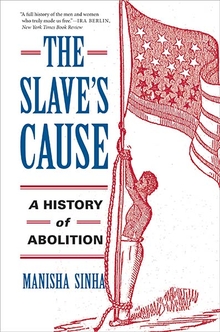
Interview with Manisha Sinha, 2016 SHEAR Book Prize Winner
 Manisha Sinha holds the Draper Chair in American History at the University of Connecticut. She is the author or editor of several works, including The Counterrevolution of Slavery: Politics and Ideology in Antebellum South Carolina (2000). In addition to winning the 2016 SHEAR Book Prize, The Slave’s Cause: A History of Abolition (2016) was awarded the Organization of American Historians’ Avery O. Craven Award for Best Book in the Civil War Era (2017), was a finalist for the 2017 Frederick Douglass Book Prize (Gilder Lehrman Center for the Study of Slavery, Resistance, and Abolition, Yale University), and made the long list for the 2016 National Book Award for Nonfiction.
Manisha Sinha holds the Draper Chair in American History at the University of Connecticut. She is the author or editor of several works, including The Counterrevolution of Slavery: Politics and Ideology in Antebellum South Carolina (2000). In addition to winning the 2016 SHEAR Book Prize, The Slave’s Cause: A History of Abolition (2016) was awarded the Organization of American Historians’ Avery O. Craven Award for Best Book in the Civil War Era (2017), was a finalist for the 2017 Frederick Douglass Book Prize (Gilder Lehrman Center for the Study of Slavery, Resistance, and Abolition, Yale University), and made the long list for the 2016 National Book Award for Nonfiction.
The Republic (TR): For those who haven’t read your book, would you please provide a synopsis?
Manisha Sinha (MS): The Slave’s Cause is a comprehensive history of abolition that extends its boundaries back to the revolutionary era and employs a social movement perspective to highlight the roles of ordinary men and women, black and white. Challenging conventional historical wisdom, it argues that slave resistance rather than bourgeois liberalism defined the movement and that the abolition overlapped with other contemporary transnational radical movements such as feminism, utopian socialism, pacifism as well as the struggle for labor, immigrant, and Native American rights.
TR: What led you to choose this topic for your book?
MS: If I was to be flippant, I would say that I chose to write about abolitionists because I wanted to write a book about people I liked, my first book was on southern slaveholders. But in a way my first book did lead me to this project. I had written about South Carolinian slaveholders, who were at the vanguard of secessionist and proslavery ideology and I wanted to explore the opposite of that ideological position, which led me to the abolitionists. Ironically, many US historians have been far more respectful of the ideas and words of slaveholding politicians and constitutionalists than abolitionists, whose ideas were commonly dismissed as rhetoric and who were caricatured as unthinking extremists and fanatics. I wanted to engage the words and ideas of these men and women, many of them former slaves, who proved to be a match for the slaveholding class. Of course, it helped that I taught at Massachusetts and many of my archives were near me!
TR: Which historians and/or writers most influenced your research for this book?
MS: The idea for this book was perhaps born in my advisor Eric Foner’s class The Radical Tradition in American History, when he bemoaned that the abolitionists still lacked a good book. Probably most influential were African American writers and historians like W.E.B. Du Bois, Archibald Grimke, Charles Wesley and Carter G. Woodson who had a very different perspective on abolitionists than mainstream American historians, many of whom like David Donald were southerners and quite biased in their view of abolition.
I was also inspired by many recent historians, who had written about various aspects of the movement and groups of abolitionists like John Stauffer, Nell Painter, and David Blight that pointed the way to reimagining the abolition movement as a radical, interracial social movement. I found the work of David Brion Davis to be foundational even when I disagreed with him.
TR: The recent controversy over Confederate monuments has reignited the debate about slavery’s role in the Civil War. While the historical consensus on this topic has been settled for decades, it doesn’t appear that many Americans are aware of the historical evidence that speaks to the institution’s centrality to white southerners’ society. Why do you think the American public is so historically unaware when
it comes to this topic?
MS: I think the public perception and memory of the Civil War and the history if slavery has long been at odds with that of professional historians. That is changing now as more and more prominent historians engage with the public and write books meant to reach wider audiences. But that can be a painfully slow process and here I think one must give credit to public history sites and museums, journalists and writers, who are now making a serious attempt to convey the latest in historical scholarship to larger audiences. There will always be some people who will outright reject information that challenges them and deeply rooted beliefs, a parallel perhaps is climate change deniers. Perhaps we are partly to blame for not conveying our scholarship to broader audiences. I have recently written about this in an anthology, The Future of History, put out by the Massachusetts Historical Society.
TR: What is your current/next project?
MS: I am currently writing a book about Reconstruction. I want to explore what happened to the abolitionist project after the war and why the success of their program for black citizenship was so short lived.
